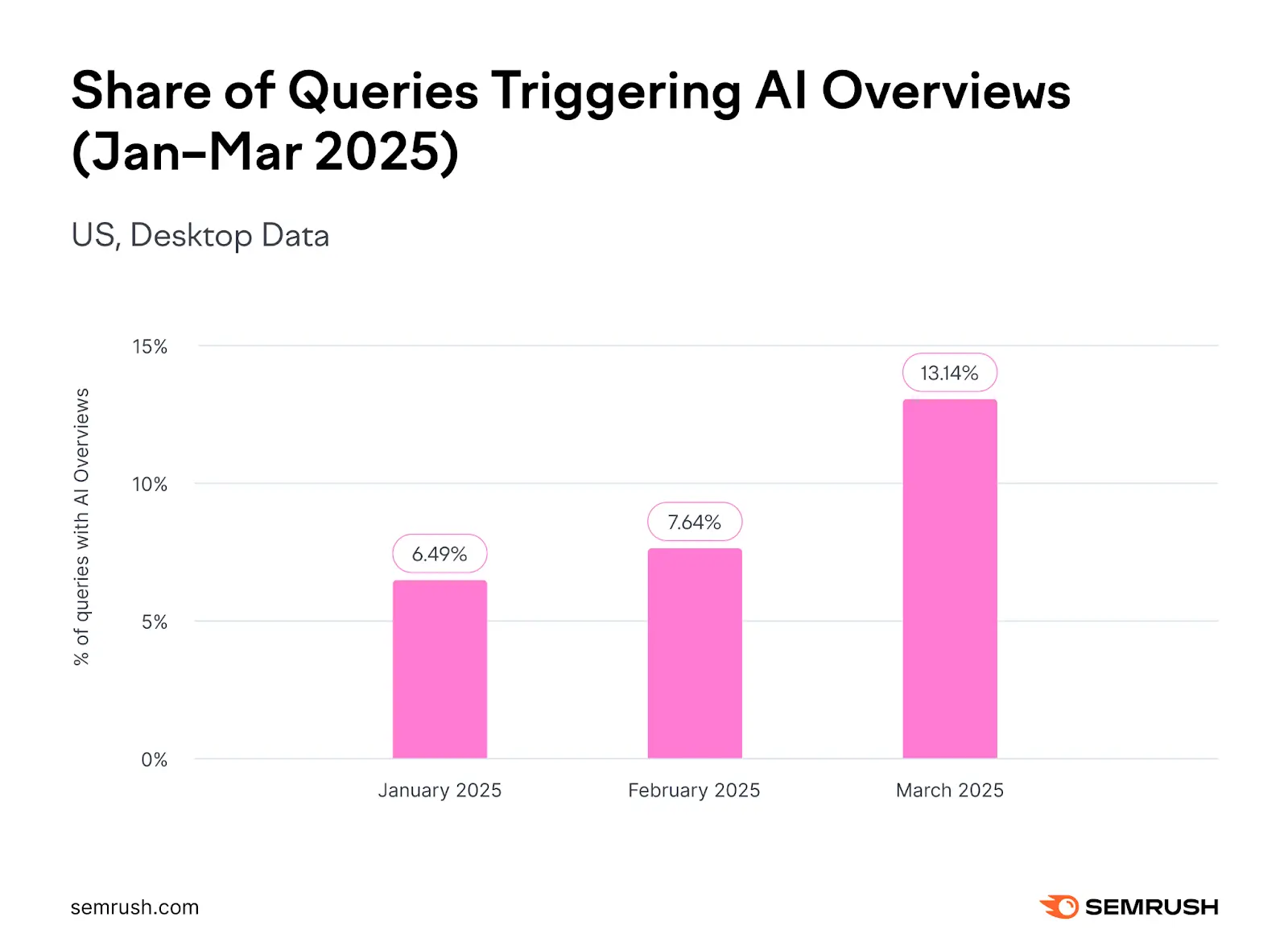A recent study by Semrush on AI overviews from March 2025 has confirmed what many SEO experts already suspected: AI overviews are probably the most disruptive change to the search landscape since featured snippets.
The study shows that the proportion of search queries that trigger an AI overview has risen from 6.49% to 13.14% in just a few months. This means that Google has evolved from a pure search engine into an “answer engine”.
For marketers, this means that the strategy must no longer only aim to rank on page 1, but rather to be cited as a trustworthy source in the AI response.
1. The new search reality: from click to zero-click and back again
AI overviews are AI-generated summaries that appear above the organic search results. They answer complex questions and summarise information from various sources. The Semrush study provides exciting insights into this:
- Increasing adoption: AI overviews are here to stay. The rise has been cross-industry, meaning the feature is not an experiment, but a core component of search.
- Zero-click behaviour: Although one might assume that the AI overviews increase zero-click searches, the study shows the opposite. The zero-click rate actually fell slightly for the keywords concerned. This shows that AI changes search behaviour, but many users still end up visiting a source.
Reading tips
In his article “Top 7 AI WordPress Plugins 2025” Jan discusses generative AI tools that are helpful and useful for content creation. Similarly, in his article “The Influence of AI Technologies on SEO” Moritz explains how revolutionary AI technologies such as Bard and ChatGPT are changing the SEO game.
2. What AI Overviews really want: The E-E-A-T imperative
The study confirms that AI insights are gaining the strongest foothold in industries based on trust and facts. Sectors such as science, healthcare and law & government experienced the greatest growth. This is a direct signal from Google that expertise, experience, authority and trustworthiness (E-E-A-T) are still the decisive criteria for selecting a source.
This will strengthen your E-E-A-T profile to be cited as a source:
- Expertise & experience: Show your expertise not only in the texts, but also through detailed author bios, mentioning awards or case studies. The AI looks for signs of human experience.
- Authority: Your website must be perceived as a trustworthy authority. Links from renowned industry websites and mentions in trade magazines are essential for this. A strong, well-known brand is also an advantage.
- Trustworthiness: A secure, error-free and transparent website is the foundation. Providing links to the sources of your content can also increase credibility in the eyes of the AI.
3. Content strategy 2.0: writing for people and AI
The Semrush data shows that AI overviews are primarily triggered by information-based long-tail keywords (e.g. “what is BMR” or “difference between debit and credit”). Superficial, interchangeable content will no longer play a role in the new search.
- From blog post to answer: Create content that responds directly to these information-based questions. The AI searches for definitions, comparisons and clarifications. Give the concise answer immediately at the beginning of the article or, in the case of extensive content, at the beginning of a paragraph. Helpful guides are the new blogs.
- Uniqueness is key: In the sectors that are most affected (e.g. law), it is no longer enough to provide general information. You need to go beyond informational content and prioritise distinctive viewpoints, expert commentary and interactive formats (e.g. tools, videos).
- Structured data as a secret weapon: Use schema markups such as FAQ or how-to schema. This helps the AI to understand your content more quickly and identify it as a precise source of information.
New: Raidboxes AI Site Assistant
With the new Raidboxes AI Site Assistant, you can create your website in just a few steps – without any technical stress. Whether it’s a business website, store or portfolio: You enter your prompt and the AI delivers the design, structure and content. Test the new AI Site Assistant now!
4. Working with AI Overviews instead of fighting against it
The study suggests that AI overviews do not replace the familiar SERP formats, but rather supplement them. They are rarely combined with the monetised areas (ads, shopping). This means that the organic area is the playing field for AI.
- Earn a place in the answer: Your goal is no longer just to rank on page 1. Your goal is to be cited in the AI’s answer. This will continue to give you authority and visibility. As the AI answers also draw on good sources beyond the first page, they are also an opportunity for competitive keywords for which top rankings would otherwise be very difficult to achieve.
- Danger for brand traffic: The study shows that even navigational search queries (searching for your brand) are increasingly triggering AI overviews. Take this as a warning signal that even direct brand traffic is no longer guaranteed. Your brand must be so strong that the AI cites it as a relevant authority.
Conclusion: A look into the future – rethinking SEO
The AI revolution in search is here, and it’s not an obstacle, but an invitation to refine your digital marketing. The time when you can succeed with superficial mass production is over.
The future of SEO lies in quality, authority and usability. Your website must be a trusted, unique and irreplaceable source of information. Those who adapt now will not only survive the AI revolution, but will emerge from it stronger and firmly anchored as experts in the minds of customers and AI.
Subscribe to the Raidboxes newsletter!
We share the latest WordPress insights, business tips, and more with you once a month.
"*" indicates required fields



Leave a Reply